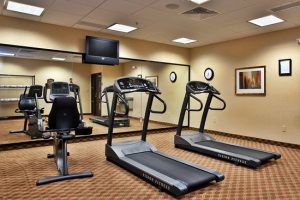The Benefits of Having a Plan
A short story…
Over my coaching career I have stayed in quite a few hotels. Some have been nicer than others. I quickly realized if I was going to stay in decent physical shape I was going to have to get used to working out on the road. This was a bit of an adjustment considering I am a creature of habit. I like my gym I am used to. I like going in and doing my routine with the equipment I know will be available. It is very rare that the hotel we are staying in has a decent setup let alone one as good as my gym.
 The problem with a new fitness center at a hotel is people tend to go in without a plan. They walk in and check what is available. A few dumbbells, a broken treadmill, a stationary bike, and a swiss ball are usually staples. The first reaction (I know because I have felt it) is “what am I going to get done in this place?” Then you start.
The problem with a new fitness center at a hotel is people tend to go in without a plan. They walk in and check what is available. A few dumbbells, a broken treadmill, a stationary bike, and a swiss ball are usually staples. The first reaction (I know because I have felt it) is “what am I going to get done in this place?” Then you start.When people don’t have a plan the workout is generally awful. You do 3 sets of this or that, you check the clock, jog a mile, and finish with some crunches. Twenty-four minutes later you walk out. What are you supposed to do with this awful setup? That was my story until I realized the fitness centers were not changing.

I made one adjustment and it often led to better workouts than what I had at my home gym. It was simple… make a plan. No matter the setup, I would determine a muscle group I was going to work. I would then sit down and write set and rep goals for the workouts for that muscle group. Even if there was zero workout equipment I would find ways to hit that muscle group from different angles and FINISH whatever I wrote down. I began to have much better workouts because it forced me to learn more options and to track what I was doing.
So why is this story on a baseball website?
This is a trick to development in general. You have to have a plan. Too often we go out and take ground balls off of a fungo, hit batting practice, or take fly balls with no plan. I try to encourage players to go into the day with a goal. “Today I am going to improve __________.” Then work to make a plan, do the plan, and chart the results.
 You can do this even if you cannot decide the practice plan for your team. It can almost be a practice plan within the practice plan. For example, if you want to improve throwing on the run but it isn’t on the team’s plan then be sure the fungo hitter mixes those in and keep track for yourself.
You can do this even if you cannot decide the practice plan for your team. It can almost be a practice plan within the practice plan. For example, if you want to improve throwing on the run but it isn’t on the team’s plan then be sure the fungo hitter mixes those in and keep track for yourself.
It is better to take one bucket of grounders and track your success vs. taking a random amount, even if that amount is more reps than the bucket. So if the bucket holds 50 balls and you were 48 out of 50 it is better than taking 75 but having no idea of how successful you were. All successful people track their progress and are aware of their weak areas. This allows them to attack these weaknesses with precision until they are no longer weak and sometimes even become a strength.
Your development is your responsibility first. Yes, your coaches help and you should lean on them often but your career will really depend on the tools you have. Use your coaches to get direction on what will make you the absolute best you can be. This can be a great starting point. But in the end you have to really take responsibility to maximize your own potential.
If you decide to just go practice with no tracking of how you are developing then the process will take much longer or might not ever happen at all. Just like lifting weights, when you track what you are doing you can push yourself to improve each time. So good luck and use this easy adjustment – make a plan.
Join today and see what many colleges and universities have already utilized in their current spring season.
